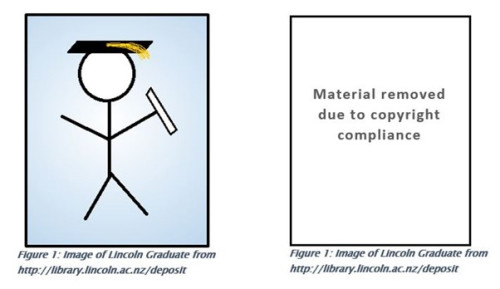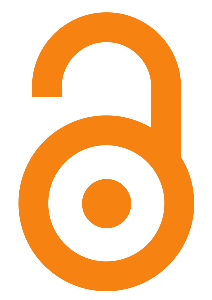Copyright and Open Access
Copyright protects the rights to your own work, and highlights the responsibilities you have when using other people’s work. When authors choose to make their work Open Access, it becomes easier to share and build on.

When you copy more than a short quote from another author’s work, you need to make sure you have permission – either from a Creative Commons licence on the work, or by contacting the copyright holder. When you publish your own work, you should also understand your rights, and think about what permissions you may want to grant future users.
Using someone else's work in your paper or thesis
Quoting up to a paragraph
This is fairly straightforward. When quoting a very short section of someone else’s work, eg a paragraph or less, this is normally permitted under the Copyright Act 1994. Academic practice is to always clearly cite the source of your quote.
Using a longer section or figure or image
If you’re quoting a longer section, or copying a photograph, map, chart, table, diagram or other figure or image, you need permission from the copyright holder. They might grant permission pre-emptively, eg by applying a Creative Commons licence, or you might need to request permission from them.
Check if the work displays a Creative Commons licence logo. If so, you can easily find the conditions for that specific licence. Eg
- an –NC (non-commercial) variation means you only have permission to use the material in a publication that is not sold for profit. It would be allowed in your thesis (assuming you’re not making copies available for sale) but wouldn’t be allowed in most journal articles (which are run by for-profit companies).
- an –SA (share-alike) variation means you can only use the material if you publish your own work under the same licence.
In all cases you must clearly cite the source of the material as normal. The in-text citation (or the caption for an image or figure) should also state that you’re using it under the terms of the specified Creative Commons licence, eg
Figure 1: Cyclic voltammograms of wool fabric (Chai, 2017, used under Creative Commons Attribution Non-Commercial licence)
If there’s no Creative Commons licence or it doesn’t permit your use, you will need to track down and request permission from the copyright holder. This may be the author or (especially for journals) the publisher.
For journal articles, look for a link that says Rights and Permissions, Reprints and Permissions, Request Permissions, or similar. Follow the instructions. Many publishers use a service called RightsLink where you can fill out the appropriate details and be sent a license agreement outlining the conditions of use.
For other material, look for a copyright statement and email that person or organisation. If it’s still unclear, email the author. In your request, include:
- A brief introduction to yourself and your work, eg a Masters or PhD student enrolled at Lincoln University undertaking a thesis or dissertation.
- An explanation of how you want to use their work. If relevant, emphasise that the work is for educational, non-commercial purposes.
- If the item is part of your thesis to be deposited in Research@Lincoln, consider including a link to the site.
- A precise description of the work you want to use and where you found it.
- Include a date by which you would like a response. Allow enough time for them to consider the request, especially if it’s an organisation, and remember that they’re not obliged to respond or to give you permission.
We provide a sample MS Word form – thesis-copyright-request – which you can modify to request permission. Keep copies of your requests and any responses received.
When permission is granted, you should cite the source as normal. The in-text citation should include an acknowledgement of permission, eg
Figure 2: Situational analysis diagram (Muru-Lanning, 2016, used by permission)
If you have (with permission) modified the figure, then you would say “adapted by permission” instead.
Depositing your thesis/dissertation in Research@Lincoln
Once you have permission for every excerpt and figure you’re using from other people’s work, then you can simply deposit the thesis as-is.
- Make sure you acknowledge permission for each work as described above
- We don’t need copies of the requests you sent or responses received, but make sure you keep copies for your own records, in case of dispute.
If there is anything where you could not get written permission, you will need to upload two files with your deposit into Research@Lincoln.
This is the file including the images/figures, which you submitted for examination. (Copies for purposes of examination are permitted under section 49 of the Copyright Act 1994. It will be made available to Lincoln University staff and students for private research and study under section 43.)
This file will be Open Access to all, so any material you couldn’t get permission for must be removed. To do so:
- Delete the image or figure, but leave the label/description/citation in place.
- Insert a text box, equal in size to the removed material, to make sure that page numbers and layout don’t change.
- In the text box, insert the wording “Material removed due to copyright compliance”.
For example, on the left you can see the image that would be used in the complete file and on the right, how it has been replaced with a blank space and text while leaving the caption in place.

Your rights as an author
Under Lincoln University’s Intellectual Property Policy, authors own the copyright for any papers written while employed by, or studying at, Lincoln University. The Lincoln University House Rules add more detail on intellectual property for postgraduate students.
Making your work available on Research@Lincoln doesn’t affect your copyright.
If you publish in a journal or book, the publisher’s contract may ask you to transfer your copyright to them. If you want to retain the right to reuse figures in conference presentations or other scholarly works, or to make a copy available for course readings, you can modify the copyright transfer agreement using a SPARC Author Addendum.
Making your work Open Access
 Unless you’ve transferred your copyright to someone else, you always retain copyright of your work. But you can choose to make it Open Access, either by simply making it free to read, or by applying a Creative Commons licence that pre-emptively gives people permission to copy or adapt the work, depending on which licence you choose.
Unless you’ve transferred your copyright to someone else, you always retain copyright of your work. But you can choose to make it Open Access, either by simply making it free to read, or by applying a Creative Commons licence that pre-emptively gives people permission to copy or adapt the work, depending on which licence you choose.
The more open you make access to your work, the easier it is for other people to share it and raise the profile of your research. This is why Lincoln University’s Open Access Policy encourages authors to publish openly where there aren’t cultural, ethical, or commercial reasons for protecting material.
If you want to publish in an Open Access journal that requires Article Processing Charges (APCs), you can apply for APC funding.
More information
For any questions about copyright or Creative Commons licences, contact copyright@lincoln.ac.nz

